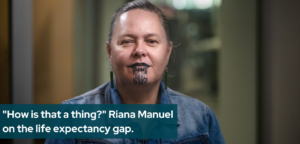
A seven-year gap between Māori and non-Māori life expectancy should be falling within five years, shares Global Women Member and chief executive of the Māori Health Authority, Riana Manuel.
Drawing on her vast experience as a health sector champion — recently appointment to Te Aka Whai in July — Riana Manuel lends her voice to RNZ’s newly-launched investigation on the life expectancy gap between Māori and non-Māori.
Currently, there’s a 7-year gap in the life expectancy between Māori and non-Māori people. Riana shares that, in order to change this, measures must directly address the racial element. Moreover, Riana reassures that there shouldn’t be fear in addressing them head on.
“You have to be really determined to look at the people who have this less life expectancy and decide to put initiatives in place without being afraid of what that’s saying” — Riana Manuel, chief executive of the Māori Health Authority.
“You have to be really determined to look at the people who have this less life expectancy and decide to put initiatives in place without being afraid of what that’s saying,” she shares with RNZ’s Ella Stewart.
Ideas around health targets — and the debates around their efficacy — are boldly reflected on by Riana: “I’m really happy to go on record and say that, simply because if you set a target, you have to be able to address that when you don’t reach the target what does it actually mean?” New targets are due to be outlined in early 2023 for both Te Whatu Ora and Te Aka Whai ora.
This, plus thoughts around what holistic health targets, deep-dives into inequalities and the compounding effect of healthcare disparities are also explored by Riana in this thought-provoking interview.
Discover and watch more of RNZ’s Ella Stewart’s full interview with Riana as the first think-piece in the series, which starts today.

